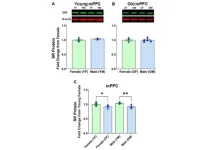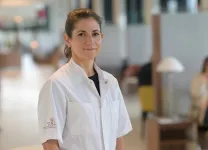(Press-News.org) Researchers from the Institute of Psychiatry, Psychology & Neuroscience (IoPPN) at King’s College London have investigated the feasibility of a new home-administered treatment for binge eating disorder. The new treatment combines a gentle brain stimulation technique called transcranial direct current stimulation (tDCS) with a training programme that targets unhelpful patterns of attention around food.
The findings, published in BJPsychOpen, indicate that this might be a welcome new avenue for treatment.
Binge eating disorder (BED) is a serious mental illness that can affect anyone of any age, gender, ethnicity or background. People with the disorder have recurring episodes of losing control over their food intake, consuming lots of food in a short period of time until they are uncomfortably full. BED is typically accompanied by anxiety and low mood and linked to obesity and metabolic complications.
New approaches to meet an unmet need
Psychological therapies are recommended for treatment of BED and about 50 per cent of those who receive treatment achieve a full and lasting recovery.
Research has shown that self-regulatory processes in the brain are instrumental in maintaining the cycle of binge eating and innovative approaches such as tDCS and attention bias modification training (ABMT) aim to target these processes.
TDCS changes function in the prefrontal areas of the brain by applying a gentle electrical stimulation to carefully selected areas of the brain via electrodes placed on the scalp. ABMT improves self-regulatory control by correcting unhelpful biases towards food cues and training people with BED to change how they attend to high-calorie food cues.
TANDEM trial
New tDCS devices have been developed to enable self-administration at home. The TANDEM trial investigated whether the simultaneous delivery of at-home self-administered tDCS with ABMT is feasible, acceptable and potentially effective for the treatment of BED.
Researchers recruited 82 participants who were overweight or living with obesity and who met criteria for BED diagnosis. Participants were allocated to one of four groups that received either:
10 sessions of at-home self-administered tDCS during ABMT
10 sessions of pretend (sham) tDCS with a headset that did not deliver electrical stimulation during ABMT,
10 sessions of ABMT only,
No treatment (they remained on a waitlist for 8 weeks).
Less Binge Eating, Weight Loss and Mood improvements
Changes to binge eating behaviour were most pronounced in those who received real tDCS with ABMT. In this group binge episodes were reduced from around 20 times a month on average at baseline to six times a month at follow-up six weeks later.
Participants in the real tDCS with ABMT group also reported that they lost approximately 3.5 to 4 kg between baseline and six-week follow-up (reduction in mean body mass index [BMI] of 1.28 points). In comparison, over the same period time those who received ABMT with sham tDCS reported that they lost about 1.5 to 2 kg on average (reduction in mean BMI of 0.52 points) and those who received ABMT only reported negligible change in their weight (reduction in mean BMI of 0.07 points). There was no change in eating behaviour or weight loss in the no treatment control group.
The group who received real tDCS with ABMT also reported substantial improvement in their mood between baseline and follow-up. No similar change in mood was reported in those who received sham tDCS with ABMT or in those who received ABMT only, and there was no change in mood in the no treatment control.
Dr Michaela Flynn, Research Associate at King’s IoPPN, and first author on the study said: “Current treatments for binge eating disorder are only effective for some people and many need further or different support to get well. Our study is the first to look at a new option for home-based treatment that offers a different approach to treating binge eating disorder. TDCS targets the brain driven patterns of behaviour that might be contributing to the loss of control around food, enabling people to shift entrenched thinking and behaviour around food.
“Participants commented that their mood felt lighter, which may be a key part of why they reported changes in eating behaviour and weight loss that lasted for some time after treatment ended. Our findings are encouraging, and we want to explore this on a larger scale with more participants.”
Professor Ulrike Schmidt OBE, Professor of Eating Disorders at King’s IoPPN, aand coauthor said: “Binge eating disorder is a really neglected, but common and distressing eating disorder that is typically surrounded by a lot of shame. The treatment we tested is home delivered, which allows it to reach people who may find it difficult to come into the community. For some time eating disorder services have not been funded to work with or treat people with binge eating disorder. Importantly the treatment described here is straightforward to deliver making it potentially highly scalable in the NHS.”
Professor Iain Campbell, Senior Research Fellow at King’s IoPPN, said, "These encouraging clinical findings will help refine treatment protocols and promote studies of brain processes associated with neuromodulation. Future studies should verify these preliminary findings in a larger clinical trial which includes longer term follow-up beyond six-weeks. Additionally, the use of functional imaging and wearable technologies (which may provide insight into day-to-day changes in physical activity, food consumption, mood, and so on) might yield greater insight into the mechanism driving the therapeutic effects. Studies pairing tDCS with other treatments should also be considered such as mindfulness or other cognitive training techniques. "
This research was supported by the National Institute for Health and Care Research (NIHR) Maudsley Biomedical Research Centre (BRC).
A feasibility randomised sham-controlled trial of concurrent self-administered transcranial direct current stimulation (tDCS) and attention bias modification training in binge eating disorder by Flynn, M., Campbell, I., & Schmidt, U, BJPsychOpen. DOI: 10.1192/bjo.2024.54
Notes to Editors
For further information, please contact Patrick O’Brien (Media Manager) on 07813 706 151
The labels have been added to this press release as part of a project run by the Academy of Medical Sciences seeking to improve the communication of evidence. For more information, please see: http://www.sciencemediacentre.org/wp-content/uploads/2018/01/AMS-press-release-labelling-system-GUIDANCE.pdf
About King’s College London and the Institute of Psychiatry, Psychology & Neuroscience
King’s College London is amongst the top 35 universities in the world and top 10 in Europe (THE World University Rankings 2023), and one of England’s oldest and most prestigious universities.
With an outstanding reputation for world-class teaching and cutting-edge research, King’s maintained its sixth position for ‘research power’ in the UK (2021 Research Excellence Framework).
King's has more than 33,000 students (including more than 12,800 postgraduates) from some 150 countries worldwide, and some 8,500 staff. The Institute of Psychiatry, Psychology & Neuroscience (IoPPN) at King’s is a leading centre for mental health and neuroscience research in Europe. It produces more highly cited outputs (top 1% citations) on psychiatry and mental health than any other centre (SciVal 2021), and on this metric has risen from 16th (2014) to 4th (2021) in the world for highly cited neuroscience outputs. In the 2021 Research Excellence Framework (REF), 90% of research at the IoPPN was deemed ‘world leading’ or ‘internationally excellent’ (3* and 4*). World-leading research from the IoPPN has made, and continues to make, an impact on how we understand, prevent and treat mental illness, neurological conditions, and other conditions that affect the brain.
www.kcl.ac.uk/ioppn | Follow @KingsIoPPN on Twitter, Instagram, Facebook and LinkedIn
END
New home-administered treatment for binge eating disorder shows promising results
2024-06-06
ELSE PRESS RELEASES FROM THIS DATE:
Nuclear medicine highlighted in documentary series
2024-06-06
Reston, VA—The field of nuclear medicine is in the spotlight this season on the TV documentary Jobs of Tomorrow. The series, hosted by Kristin Marand, explores how technology and innovation drive the changing job market and impact the workforce.
Six episodes of this season of Jobs of Tomorrow highlight the many facets of nuclear medicine and the Society for Nuclear Medicine and Molecular Imaging (SNMMI) members currently working in the profession.
Nuclear medicine is a multidisciplinary field that encompasses physicians, chemists, physicists, pharmacists, and technologists—all ...
Serine racemase expression in the brain during aging in male and female rats
2024-06-05
“The findings of the present study reveal that aging is linked to a decline in serine racemase protein levels across various brain regions [...]”
BUFFALO, NY- June 5, 2024 – A new research paper was published in Aging (listed by MEDLINE/PubMed as "Aging (Albany NY)" and "Aging-US" by Web of Science) Volume 16, Issue 10, entitled, “Serine racemase expression profile in the prefrontal cortex and hippocampal subregions during aging in male and female rats.”
Aging is associated with a decrease in N-methyl-D-aspartate (NMDA) receptor ...
Virginia Tech researcher helps reach nutrition security goals
2024-06-05
Food is many things.
It nourishes our bodies, delights our senses, and gives us something to gather around. Food is also a powerful cultural symbol, reflecting traditions, values, and histories of communities around the world.
But for a researcher in the College of Agriculture and Life Sciences, food is also medicine.
Bailey Houghtaling Ph.D. ’19, a registered dietician, is working to promote overall wellness among low-income individuals experiencing food insecurity, aiming to prevent or treat diet-related diseases.
“Access to enough nutritious food is essential for individual well-being,” ...
William T. Grant Foundation announces funding for UT, Cherokee Health Systems for research-practice partnership
2024-06-05
Trustees of the William T. Grant Foundation, the Spencer Foundation, the Doris Duke Foundation and the Bezos Family Foundation have approved funding for the winners of the 2024 Institutional Challenge Grant competition. The University of Tennessee, Knoxville, and Cherokee Health Systems will receive $650,000 to grow their unique research-practice partnership — and to learn how to implement community-engaged scholarship that results in ongoing positive outcomes.
UT has a long history of working with CHS, a federally qualified ...
Democratizing plant research: A new cost-effective solution for advanced phenotyping
2024-06-05
Phenotyping, which involves assessing observable plant characteristics, is crucial for understanding plant development and response to environmental stresses. Traditional methods are often cumbersome, costly, and destructive, limiting research scope and scale. A new system of affordable, mobile, and high-throughput phenotyping tools is making the technology accessible to a wider range of users.
The "all-in-one" solution, developed by a team at the Boyce Thompson Institute (BTI), includes low-cost hardware designs, data processing pipelines, and a user-friendly data analysis ...
Multiple randomized trials prove more stroke patients can benefit from thrombectomy
2024-06-05
FOR IMMEDIATE RELEASE: June 5, 2024
CONTACT: Faith James
fjames@vancomm.com or 202-248-5450
Multiple Randomized Trials Prove More Stroke Patients Can Benefit from Thrombectomy
Society of NeuroInterventional Surgery issues update to standards and guidelines following research in favor of minimally invasive procedure for deadly type of stroke
FAIRFAX, Va. — Access to thrombectomy should be expanded to include patients who experience basilar artery occlusion (BAO), a deadly type ...
Researchers led by UMass Amherst solve 2,000-year-old mystery of the shipworm
2024-06-05
June 5, 2024
Researchers Led by UMass Amherst Solve 2,000-Year-Old Mystery of the Shipworm
Secret of the world’s most destructive and intriguing mollusk has implications for everything from climate change to human health
AMHERST, Mass. – They bedeviled ancient Greek navies, helped shipwreck Christopher Columbus, aided in the sinking of the Spanish Armada and caused the wharves in San Francisco Bay to collapse into the sea, but until now, scientists have been unable to pinpoint exactly ...
Immunotherapy before surgery very successful in treating colorectal cancer
2024-06-05
A short course of immunotherapy was found to be highly effective in a subset of patients with colon cancer. The treatment, which consisted of two cycles of immunotherapy prior to surgery, was effective in almost all patients. In two third of patients, there were no longer any live tumor cells at the time of surgery. The patients’ immune system had cleaned up the cancer cells. These groundbreaking discoveries were made as part of the NICHE-2 trial at the Netherlands Cancer Institute and have been published in the New England Journal of Medicine.
Patients with colon cancer with ...
Encouraging Phase 1 data for glioblastoma treatment reported by UAB researchers at ASCO
2024-06-05
BIRMINGHAM, Ala. – Preliminary clinical data for glioblastoma multiforme patients enrolled in a Phase 1 clinical trial at the University of Alabama at Birmingham demonstrated that 92 percent of evaluable patients treated with INB-200 exceeded a median progression-free survival of seven months with concomitant temozolomide chemotherapy. The median follow-up was 11.7 months.
This survival data along with radiographic improvements are indicative of positive treatment effects, which highlights the potential of IN8bio’s genetically modified, chemotherapy-resistant gamma-delta T cells ...
YALE NEWS: Early life experiences linked to racial disparities in cognition
2024-06-05
New Haven, Conn. — Negative early life experiences, such as attending segregated schools, contribute significantly to cognitive decline and cognition disparities between older Black and white Americans, according to a new study led by researchers at the Yale School of Public Health.
The study, published in JAMA Internal Medicine, is the first to look at the impact of school segregation upon later life cognition using a large representative sample of the U.S. population, said lead author Xi Chen, associate professor of public ...





